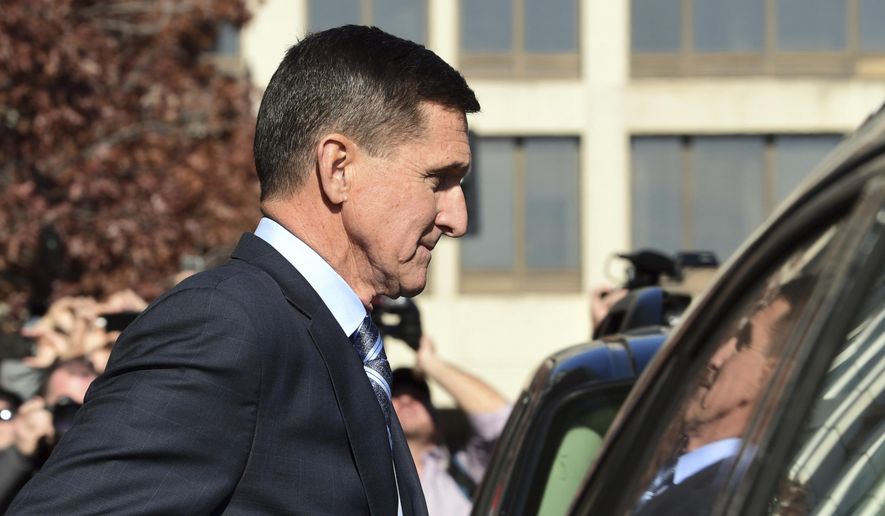Rally organizers, journalists and former Trump advisers caught up in the House Jan. 6 committee’s sweeping troll for phone records are fighting back in court.
The Democrat-led committee has subpoenaed phone records from more than 100 individuals since beginning its probe in July. Since early December, the panel has been hit with at least seven lawsuits by their targets who say the committee overstepped its bounds.
The committee did not respond to The Washington Times’ request for comment.
Last Tuesday, retired Army Gen. Michael Flynn, who briefly served as national security adviser under President Trump, became the latest to sue the committee to block it accessing his records.
Mr. Flynn was issued a subpoena by the committee last month demanding that he turn over documents and appear for a deposition. According to the court filing, the committee “has sought or intends to seek” phone and email communications about Mr. Flynn and members of his family.
“When confronted about this outrageous intrusion into the private records of a cooperative witness in a legislative investigation, risking a violation of General Flynn’s rights under the 1st, 4th, and 5th Amendments to the Constitution, the Select Committee responded with nothing but silence,” the complaint said.
A judge later dismissed Mr. Flynn’s case, arguing that he did not meet procedural requirements for the court to intervene.
Mr. Flynn’s suspicion, however, is certainly not unfounded.
Several former Trump advisers, including former Chief of Staff Mark Meadows, election lawyer Cleta Mitchell and conservative public interest lawyer John Eastman, have received letters from their wireless providers alerting them that the committee demanded records.
Mr. Meadows, who the House voted to hold in contempt of Congress for twice failing to appear for depositions, said he was “blindsided” by the letter he received from Verizon.
Mr. Meadows, who was a Republican congressman from North Carolina before joining the Trump administration, bucked initial demands to cooperate with the probe. He cited the former president’s claim of executive privilege before briefly cooperating with the committee. He said he ended his cooperation once he learned the panel had gone after his phone records.
Mr. Eastman and Ms. Mitchell both said the subpoenas violate their privileges as attorneys, First Amendment free speech rights and Fourth Amendment protection against unreasonable search and seizure.
In all of the lawsuits, the plaintiffs said the scope of the records requested is overly broad and that their private communications are well beyond the scope of the committee.
“The breadth and invasiveness of the Verizon subpoena also gave the appearance of a criminal investigation, not a legislative fact-finding mission,” Mr. Meadows’ complaint said.
“It seeks private data used to track an individual person’s communications and location, information that would bear on an investigation into that individual, not on potential legislation to be passed by Congress.”
Several organizers behind Jan. 6 rally at the Ellipse have also been swept up in the committee’s phone record subpoenas. One vendor associated with the rally is also fighting a committee subpoena for its bank records.
Far-right media figure Alex Jones is also fighting in court against a committee subpoena for his cell phone records.
Most of the plaintiffs argue that the subpoenas point to the committee’s political motive to silence conservatives rather than get the truth of what happened on Jan. 6.
Georgetown Law School Professor David A. Super said that argument may face an uphill battle in court.
“The court’s not going to take that seriously because they have to respect a coordinate branch of government,” he said. “The House has authorized this committee, and the cases in which courts have found that an investigation was an invalid fishing trip are very, very rare.”
But not all of those crying fouls are from the former president’s inner circle and some may not even be supporters of the former president.
Earlier this month, freelance photojournalist Amy Harris sued the committee over its subpoena of her phone records. She said the subpoena violated the longstanding legal protections for journalists.
In the months leading up to Jan. 6, Ms. Harris had been covering the Proud Boys and was present as members of the group stormed the Capitol. Several of her photographs from Jan. 6 were published in major publications including The Washington Post and the Cincinnati Enquirer.
“These protections reflect a paramount public interest in the existence and maintenance of a vigorous, aggressive, and independent press capable of furthering a robust, unfettered debate over controversial matters and are based on the firm recognition that effective newsgathering depends significantly on journalists’ ability to secure the confidence and trust of their sources,” her complaint said.
Mr. Super said that while the phone records requests may be more visible coming from Congress, the Georgetown Law professor said the requests from the committee may just be the tip of the iceberg when it comes to the events on Jan. 6.
“For all we know, every single record that the committee is pursued is also then pursued and obtained by a grand jury investigating the same thing,” Mr. Super said. “We don’t know what grand juries do. We don’t even know when grand juries are impaneled. We do know about the committee,”
“I think they’re kidding themselves if they think this is all or even most of what’s going on,” he added.
• Joseph Clark can be reached at jclark@washingtontimes.com.




Please read our comment policy before commenting.